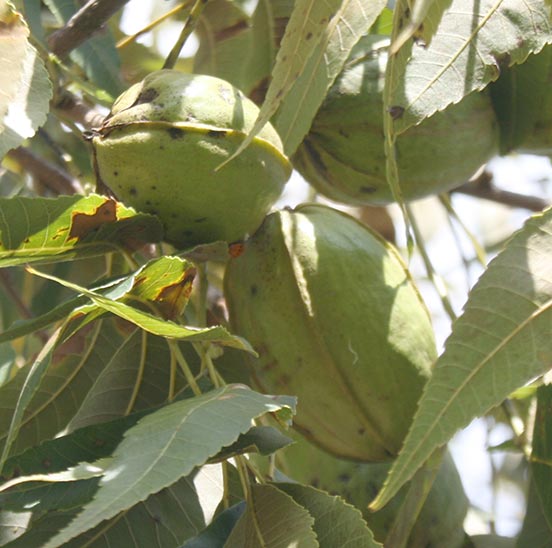

By Clint Thompson
University of Georgia, College of Agricultural and Environmental Sciences
Georgia’s dry summer helped save its pecan crop, according to University of Georgia Extension horticulture specialist Lenny Wells.
A wet spring and increased scab disease pressure had Wells and other pecan experts pessimistic about this year’s pecan crop. However, a lack of rain in June and July spared Georgia’s pecan farmers from worsening scab disease. The result is a pecan crop that’s expected to reach 85-90 million pounds, Wells estimated.
“We had all that scab inoculum built up from last year, and then we started off wet this year, with a lot of early leaf scab in the spring. Luckily, about the time that the nuts really started to size, which is when they’re most susceptible to scab, it really dried off and let everybody catch up with fungicide protection,” Wells said. “Even where there was a lot of scab pressure, our famers did a really good job of keeping the scab to a minimum, I think.”
Another encouraging factor in the early pecan season have been prices. Wells said that, for the Stuart variety, contract prices have ranged between $2.40 and $2.50 per pound, and for Desirables – Georgia’s most planted pecan variety – prices are higher at between $2.85 and $2.95. Wells expects those prices to stay high through November.

Foliage conditions, the worst he’s seen in pecan trees, have been the only discouraging sign that Wells has observed. Pests like black aphids and mites have been major nuisances for pecan farmers. Black aphids have a toxin in their saliva that causes yellow spots to appear on leaves. Mites cause scorching on leaves. Early scab pressure in the spring meant higher rates of fungicides had to be applied. This resulted in bronzing of the leaves.
“If a grower does have a lot of foliar damage and has leaf loss, that’s going to affect more of next year’s crop than this year’s. If they’ve lost a large percentage of leaves, particularly before October, that’s not good for next year,” Wells said. “Generally, we’d like to keep those leaves on until the first frost or as late as we can, just for the health of the tree.”
Wells said that, according to the United States Department of Agriculture, last year’s Georgia crop produced between 85-90 million pounds.
According to the UGA Center for Agribusiness and Economic Development, Georgia is the country’s No. 1 producer of pecans. In 2013, Georgia’s farm gate value for pecans was $315.5 million, with Dougherty and Mitchell counties named the top pecan producers.
(Clint Thompson is a news editor with the University of Georgia College of Agricultural and Environmental Sciences based in Tifton.)





Be the first to comment